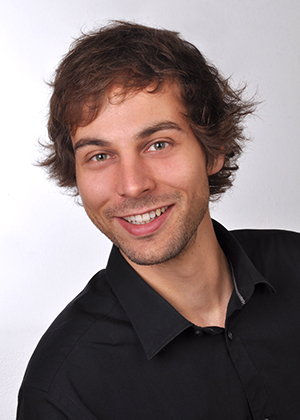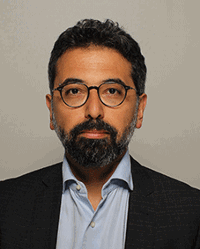Jungfleisch, Johannes MA (MA)
Johannes Jungfleisch has been employed as research assistant at the Ruhr-University Bochum since 2012. He studied Classical Archaeology and West Asiatic Archaeology at the University of Freiburg. Currently, he is in the final stages of his PhD-project at Free University of Berlin, in which he examines the large-scale simulations of architecture of the wall paintings from ‘Palace G’ at Tell el-Dab’a and their reception in the local Egyptian context. As an archaeologist, he has worked in Greece, Turkey, Lebanon and Egypt.
Kadrow, Sławomir (Prof. Dr.)
Sławomir Kadrow’s main research interests lie in prehistoric Central Europe. Currently he leads the project Great culture transformation in microregional perspective. Trends of changes inside Danubian farmers in SE Poland. Previously he worked at the Institute of Archaeology and Ethnology of the Polish Academy of Sciences in Kraków and at present at the Rzeszów University. He was a Fellow of the Humboldt Foundation at Berlin University (FU), afterwards at Bamberg University and in 2017 Mercator Fellow of the CRC 1266 ‘Scales of Transformation’ at Kiel University.
Kahlow, Simone (Dr.)
Simone Kahlow studied archaeology at Freie Universität and Humboldt-Universität in Berlin. At an early stage she specialized in medical archaeology and burial archaeology in both the Middle Ages and Post-Medieval Period, and has been dealing with these topics for nearly 20 years. Her PhD-Thesis, supported by the German Research Foundation and defended in April 2014, aimed at gaining a better understanding of the development of care institutions based on building constructions, small finds, as well as human and animal bones.
Kaiser, Jessica
Jessica Kaiser is a visiting researcher and lecturer at the Department of Near Eastern Studies at the University of California Berkeley and Adjunct Assistant Professor of Anthropology at Saint Mary’s College of California. She holds an MA in biological anthropology from the University of Stockholm, Sweden, with minors in Classics and Egyptology from Uppsala University (2006) and a PhD in Egyptian Archaeology and Bioarchaeology from University of California Berkeley (2018).
Kalaycı, Tuna (Dr.)
Tuna Kalaycı is an assistant professor of computational archaeology. His main quantitative interests are remote sensing, data analysis, and modelling. He also tackles questions of landscape archaeology and (ancient) cities. In particular, he focuses on productive landscapes, landscapes of movement, walking/walkability and neighbourhoods. His work also aims to positively challenge modern concepts, such as digitalisation, machine automation and smart cities. He is affiliated with the SAILS Initiative. He is a member of the Kerkenes Project, working on Iron Age urban dynamics.
Kalogirou, Konstantina
Konstantina Kalogirou is Lecturer in Teacher Education and Professional Learning at Cardiff Metropolitan University. Prior to this Konstantina was Deputy Head at the Sixth Form College of Cathays High School in Cardiff, Wales. She has gained a varied experience across the education sector working as an English and EFL Teacher in primary, secondary, and higher education both in Greece and in the UK. She holds a BA (Hons) in English Language and Literature from the Aristotle University of Thessaloniki. She completed her MA in Applied Theatre: Drama in Educational, Community & Social Contexts at Goldsmiths College, University of London, and she gained a PhD in Vocabulary Acquisition via Drama at Aristotle University of Thessaloniki. Konstantina’s research interests are on Language Pedagogies, Strategies of Language, Literacy, and Communication, Expressive Arts with emphasis on Drama in Education, Inclusive Education, and Cultural Heritage in educational contexts. She has published on Drama in Education, Second Language Acquisition, and Cultural Heritage applications in Education.
Kamermans, Hans (Dr.)
Hans Kamermans is associate professor at the Faculty of Archaeology at Leiden University. He studied ecological prehistory and physical geography in Amsterdam and wrote his PhD thesis on the use of land evaluation in archaeology. In Leiden he teaches archaeological methods and techniques and various courses in computer applications in archaeology.
Jungfleisch, Johannes MA (MA)
Johannes Jungfleisch has been employed as research assistant at the Ruhr-University Bochum since 2012. He studied Classical Archaeology and West Asiatic Archaeology at the University of Freiburg. Currently, he is in the final stages of his PhD-project at Free University of Berlin, in which he examines the large-scale simulations of architecture of the wall paintings from ‘Palace G’ at Tell el-Dab’a and their reception in the local Egyptian context. As an archaeologist, he has worked in Greece, Turkey, Lebanon and Egypt.
Kadrow, Sławomir (Prof. Dr.)
Sławomir Kadrow’s main research interests lie in prehistoric Central Europe. Currently he leads the project Great culture transformation in microregional perspective. Trends of changes inside Danubian farmers in SE Poland. Previously he worked at the Institute of Archaeology and Ethnology of the Polish Academy of Sciences in Kraków and at present at the Rzeszów University. He was a Fellow of the Humboldt Foundation at Berlin University (FU), afterwards at Bamberg University and in 2017 Mercator Fellow of the CRC 1266 ‘Scales of Transformation’ at Kiel University.
Kahlow, Simone (Dr.)
Simone Kahlow studied archaeology at Freie Universität and Humboldt-Universität in Berlin. At an early stage she specialized in medical archaeology and burial archaeology in both the Middle Ages and Post-Medieval Period, and has been dealing with these topics for nearly 20 years. Her PhD-Thesis, supported by the German Research Foundation and defended in April 2014, aimed at gaining a better understanding of the development of care institutions based on building constructions, small finds, as well as human and animal bones.
Kaiser, Jessica
Jessica Kaiser is a visiting researcher and lecturer at the Department of Near Eastern Studies at the University of California Berkeley and Adjunct Assistant Professor of Anthropology at Saint Mary’s College of California. She holds an MA in biological anthropology from the University of Stockholm, Sweden, with minors in Classics and Egyptology from Uppsala University (2006) and a PhD in Egyptian Archaeology and Bioarchaeology from University of California Berkeley (2018).
Kalaycı, Tuna (Dr.)
Tuna Kalaycı is an assistant professor of computational archaeology. His main quantitative interests are remote sensing, data analysis, and modelling. He also tackles questions of landscape archaeology and (ancient) cities. In particular, he focuses on productive landscapes, landscapes of movement, walking/walkability and neighbourhoods. His work also aims to positively challenge modern concepts, such as digitalisation, machine automation and smart cities. He is affiliated with the SAILS Initiative. He is a member of the Kerkenes Project, working on Iron Age urban dynamics.
Kalogirou, Konstantina
Konstantina Kalogirou is Lecturer in Teacher Education and Professional Learning at Cardiff Metropolitan University. Prior to this Konstantina was Deputy Head at the Sixth Form College of Cathays High School in Cardiff, Wales. She has gained a varied experience across the education sector working as an English and EFL Teacher in primary, secondary, and higher education both in Greece and in the UK. She holds a BA (Hons) in English Language and Literature from the Aristotle University of Thessaloniki. She completed her MA in Applied Theatre: Drama in Educational, Community & Social Contexts at Goldsmiths College, University of London, and she gained a PhD in Vocabulary Acquisition via Drama at Aristotle University of Thessaloniki. Konstantina’s research interests are on Language Pedagogies, Strategies of Language, Literacy, and Communication, Expressive Arts with emphasis on Drama in Education, Inclusive Education, and Cultural Heritage in educational contexts. She has published on Drama in Education, Second Language Acquisition, and Cultural Heritage applications in Education.
Kamermans, Hans (Dr.)
Hans Kamermans is associate professor at the Faculty of Archaeology at Leiden University. He studied ecological prehistory and physical geography in Amsterdam and wrote his PhD thesis on the use of land evaluation in archaeology. In Leiden he teaches archaeological methods and techniques and various courses in computer applications in archaeology.










